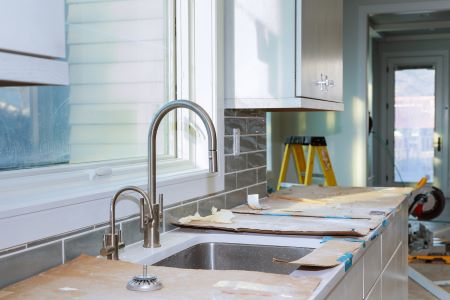When homeowners decide to expand their living space, a home addition can provide the necessary extra square footage. But, before construction begins, a solid design plan is critical. This is where the role of a home addition contractor becomes multifaceted—they do not simply execute a project. They can be actively involved in the design process as well. This engagement can ensure that the final construction is not only aesthetically pleasing but also structurally sound and functional. Here, we will explore how a home addition contractor can assist during the design phase of a home expansion, particularly emphasizing the contributions of the best remodeling contractors, the importance of remodeling estimates, and the comprehensive nature of home remodeling services.
The Multi-Dimensional Role of Home Addition Contractors in Design
The best remodeling contractors offer more than just construction services; they understand that the design process is where every successful project begins. These professionals usually work closely with architects or designers, and in some cases, they may have in-house design services or a partnership with independent designers. Their role can be to facilitate and translate the client’s vision into a feasible, detailed plan. They offer practical insights that can refine a design, suggesting materials and techniques that align with both the vision and budget of the homeowner.
Bridging the Gap Between Vision and Feasibility,
Home addition contractors play a crucial role in ensuring the practical feasibility of a design. They analyze the homeowner’s vision and evaluate it against the realities of construction, zoning regulations, and budget constraints. They can guide homeowners through complex questions: Can the property support the structural load of another story? Is there enough space on the lot for a horizontal extension? How can we integrate the new addition with the existing house systems? These are all questions a skilled contractor can help answer.
The Contractor’s Expertise in Design Considerations
Contractors bring to the table a deep understanding of building codes, material performance, and efficient layouts. The best remodeling contractors will consider factors such as natural light availability, traffic flow patterns within the home, and potential for future renovations during the design discussions. They will also look at energy efficiency, seeking to incorporate elements like better insulation, advanced window technologies, and smart home systems that could make the addition more sustainable and cost-effective in the long run.
The Contractor as a Collaborator
A home addition project is typically not a solo endeavor—it is a collaborative effort. While architects and designers create the visual and functional aspects of the addition, contractors provide the nuts and bolts reality checks. A good contractor will ask the right questions and pose alternative solutions that may not have been previously considered. Their goal in collaboration is to ensure that the design is something that can be built within the desired timeline and budget without compromising quality or design integrity.
Remodeling Estimates: Planning Financially with Design in Mind
Another critical aspect of the design process is the development of accurate remodeling estimates. Home addition contractors are adept at estimating costs because they understand the labor, materials, and time required to complete a project. During the design phase, a contractor can provide preliminary estimates that help guide decision-making. As the design becomes more detailed, these estimates are refined to provide a clearer financial roadmap for the project.
Homeowners often have a budget within which they want to work, and a skilled contractor can help navigate the design process in a way that respects this budget. By providing remodeling estimates early on, contractors allow for the exploration of various design alternatives, material choices, and construction methods that can affect the overall cost of the project.
Integrating Home Remodeling Services into the Design Process
Comprehensive home remodeling services often include assistance with design. Contractors who offer these services recognize that an integrated approach can lead to a more efficient and satisfying remodeling experience. By being involved in the design phase, contractors can ensure that all technical requirements are addressed early on. This could involve assessing the existing home’s mechanical systems to see if they can support the addition, considering the need for upgraded heating and cooling systems, or evaluating the electrical system for capacity.
Contractors who provide integrated home remodeling services also tend to have a network of experienced professionals they work with regularly. This network can include specialists like interior designers, structural engineers, and landscape architects, all of whom can contribute valuable insights during the design phase. These relationships can facilitate a smoother remodeling process and ensure a more cohesive and comprehensive design approach.
Communication and Client Involvement in the Design Process

The best remodeling contractors prioritize clear and regular communication with their clients. In the design phase, this means involving the homeowner in discussions about their preferences and needs and providing regular updates on how those preferences are being incorporated into the design. They will often use tools like 3D renderings or virtual walk-throughs to help clients visualize the addition before the construction begins, which can lead to more informed decisions and greater satisfaction with the finished project.
A contractor’s ability to communicate complex information in an understandable way can greatly enhance the design process. They act as the conduit between the technical aspects of the construction and the homeowner’s vision, ensuring that nothing is lost in translation.
Navigating Project Complexity
Home additions can be complex projects, particularly when the existing home has historical value or when the addition involves significant structural changes. Experienced contractors understand how to navigate this complexity. They bring to the design process a wealth of knowledge from previous projects, which can help in anticipating potential challenges and planning for contingencies.
In summary, a home addition contractor is more than just a builder—they can be an invaluable asset during the design process. They bring practical construction knowledge, cost-estimating skills, and a network of professional relationships that can all be leveraged to achieve a design that is both beautiful and functional. The best remodeling contractors understand that the success of a home addition project lies in the details of its design. Through the provision of detailed remodeling estimates and comprehensive home remodeling services, these professionals work hand-in-hand with homeowners to ensure that the final design is something that can be built to the client’s satisfaction, within budget, and in compliance with all regulatory requirements. By engaging a contractor early in the design process, homeowners can benefit from this wealth of expertise, ensuring a smoother, more efficient, and ultimately more successful home addition project.

